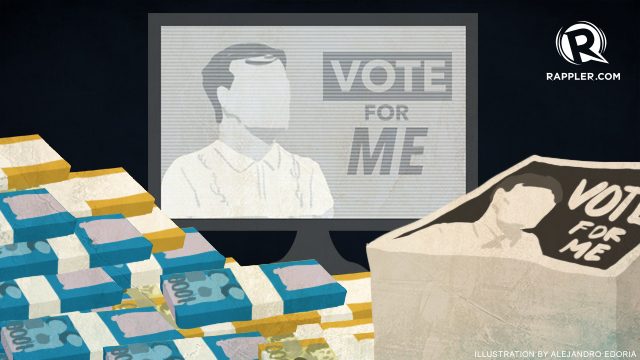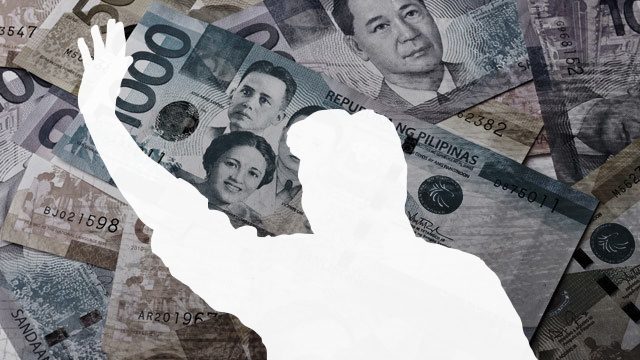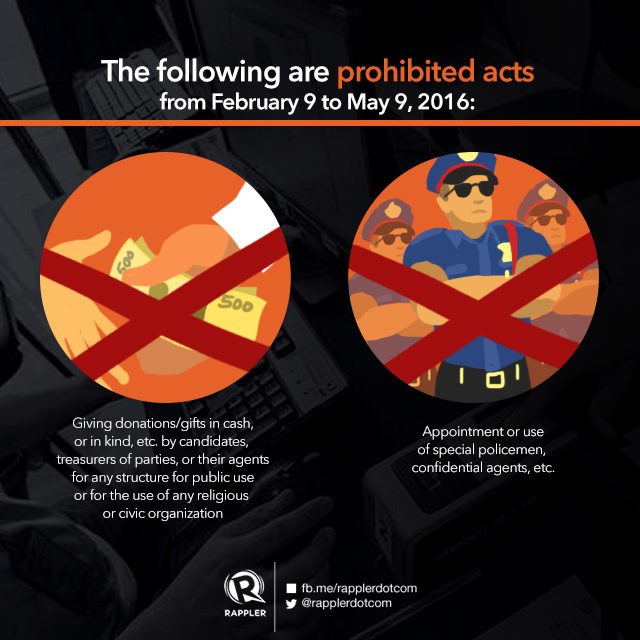SUMMARY
This is AI generated summarization, which may have errors. For context, always refer to the full article.

MANILA, Philippines – Aspirants for national positions in government are expected to up the ante as the campaign season for the 2016 polls begins on Tuesday, February 9.
Yes, even if Filipinos have probably spotted one too many campaign materials, watched campaign commercials, and have heard about or seen sorties across the country, the official campaign period is just getting started.
Given that most aspirants are all but reclusive before the period, what is expected to happen starting February 9? Rappler explains its importance:
Why February 9?
The Omnibus Election Code (OEC) of the Philippines states that the campaign period for national candidates starts 90 days before election day.
For 2016, election day falls on May 9 – or 3 months after February 9. Campaigns of candidates for national positions will end on May 7.
On the other hand, the campaign period for candidates for the House of Representatives and positions in the regional, provincial, city and municipal government runs from March 25 to May 7. Campaigning, however, is banned on March 25 due to the observance of Good Friday.
In August 2015, the Commission on Elections (Comelec) eyed the possibility of extending the campaign period to “level the playing field” for all candidates. However, it later junked this as the poll body does not have the authority to extend the period. (READ: What good will a longer election campaign period do?)
The election period, which already started last January 10, ends on June 8. The Comelec decided to start the election period a month earlier than what is stated in the OEC – 90 days before and 30 days after election day itself.
From aspirants to official candidates
More than a hundred individuals expressed their desire to run for top positions during the filing of certificates of candidacy in October 2015. However, the list has been stripped of nuisance candidates and withdrawn aspirants in recent months.
The start of the campaign season marks the time that “aspirants”, become “official candidates”.
Section 11 of Republic Act No. 8436, as amended by Section 13 of Republic Act No. 9369, says that Comelec-approved COC filers “shall only be considered as a candidate at the start of the campaign period.”
As of February 8, a total of 5 individuals are vying to succeed President Benigno Aquino III, while 6 are aspiring for the vice presidential post in the May 9 polls. (READ: Who is running for president, vice president | 2016 Elections)
Meanwhile, 56 candidates are aiming for a spot in the Senate’s magic 12, according to latest data from the Comelec. (READ: Who is running for senator | 2016 Elections)

Time to ‘strictly’ follow rules
Because they are already official candidates, they are now expected to follow rules and regulations set by the Comelec during the campaign period. Failure to comply may result in election offenses with corresponding sanctions.
These rules mostly cover campaign finance and campaign materials.
Campaign spending is limited under the OEC. Presidential and vice presidential candidates are allowed to spend only P10 per voter. Other candidates who are supported by political parties are allowed P3 while those with no support are allowed up to P5 per voter.
Political parties and party-list groups are allowed to spend up to P5 per voter.
To track their expenditures, the Comelec requires candidates, political parties, and party-list groups to submit their Statements of Contributions and Expenditures (SOCE). Overspending, based on existing rules, can lead to sanctions. (READ: How much candidates should be spending? Netizens weigh in)
Candidates, however, are required to document their finances only within the campaign period. Despite the numerous campaign advertisements prior to the set period, such expenses are not counted in the SOCE and “premature campaigning” is not considered an election offense at this time. (EXPLAINER: Why ‘candidates’ can spend so much and not report it)
But now that candidates are expected to follow the existing rules in the campaign trail or else face sanctions, voters should be vigilant and report violations. (READ: Comelec asks netizens to report campaign offenses)
Meanwhile, election propaganda in any medium – print and television, among others – is regulated under the Fair Elections Act. For example, printed materials such as leaflets, stickers, and pamphlets, among others, should not exceed 8 and 1/2 inches in width and 14 inches in length.
Materials can be posted only in designated common areas. Those posted on public structures such as road traffic signs and sidewalks, among others, are deemed “unlawful campaign materials.”
TV and radio advertisement limits, meanwhile, are as follows:
| National candidates | Local candidates | |
| Television ads | Maximum of 120 minutes per station | Maximum of 60 minutes per station |
| Radio ads | Maximum of 180 minutes per station | Maximum of 90 minutes per station |
Additional prohibited acts for campaign period
The start of the campaign period also implies the strict observance of additional rules and regulations set by the Comelec:

For the campaign period for local candidates, prohibited acts include appointment/hiring of new employees, creation of new positions, salary increases, and release/disbursement of public funds, among others. (READ: Calendar of activities, list of bans for 2016 elections)
The above restrictions are in addition to certain acts already prohibited during the election period. These include the gun ban and use of security personnel and/or bodyguards by those seeking positions unless authorized by the poll body, among others. (READ: What are not allowed when election period start)
The Comelec has also set up election security checkpoints across the country. (INFOGRAPHIC: What to expect at Comelec checkpoints)
Top candidates will be all but passive as they compete to lead the Philippines for the next 6 years. The next 3 months – the period of discernment and decision-making by Filipino voters – are going to be critical. – Rappler.com
Add a comment
How does this make you feel?
There are no comments yet. Add your comment to start the conversation.